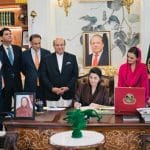In the late 1990s, an NGO partner of UNDP convened an all-parties conference on environment in Islamabad. There were many interesting speakers, but Dr. Ghulam Hussain, former Secretary General of the Pakistan People’s Party made 3 thought provoking comments on the failure of our system of governance. He said that we struggled for independence from the British, but we still feel nostalgic about British rule. One wonders what explains this paradox. It is simple to understand though; the British were unjust to the nation but gave justice to the individuals. He implied that our court and justice system has declined after the independence. British left behind the physical and administrative structure that turned into a body without the soul. He gave another indicator of the dark shadows of our collective conscience. He said that an officer under British rule considered himself a civil servant and in present day Pakistan, an officer considers himself a government servant. A third indicator is our place in the contemporary global community. We think that we are at war with non-believers and that we are destined to win because we are God’s chosen people. But we are overpowered by our adversaries in every field. Why have things gone wrong? This is happening because the war is not between the believers and non-believers but between non-believers and hypocrites.
We may agree or disagree with these views, but I think Dr. Ghulam Hussain was right on one point, it is us not ‘them’ who are responsible for our state of affairs. We are not ranking low on Islamicity Index because of any foreign conspiracy. The only conspiracy that Western powers have hatched against us is that they have handed the responsibility of running our affairs to us. We lack the moral courage to accept that we cannot agree on a code of conduct that is acceptable to all. We have an extremely low capacity to honor our commitments and build trust with others. We keep looking for scapegoats when we fail. It has to be Army or America, or infidels, not the habits of our hearts and minds. We are unable to see that the problem starts with the individual. The very first objection raised against taking personal responsibility is that ‘what can a powerless person like me do?’ This statement is made by the people in power positions more than anyone else. It is important to understand here that every person is responsible to change only whatever s/he does on daily basis not what others are doing. One problem that we face as a nation is that we are trying to change others most of the time. We have a low opinion of individual action. We hide behind the belief that nothing can be done alone. We underestimate the treasure of creative energies that each one of us has been endowed with.
Let me give you a very simple example to explain my point. A very honest and gifted friend of mine who worked at UNDP shared this story. He used to work as an executive secretary of UNDP’s resident representative (RR) in Pakistan. Let me call this friend X to protect his privacy. X was a very meticulous, conscientious, and hard working person. One morning when the RR entered his office in the morning, he saw some dust on the bookshelf on the back of X’s desk. He asked X why he didn’t dust off the shelf. X could not find a proper excuse, so he responded, “you didn’t ask me”. RR retorted, “Use your mind X, use your mind”. A bulb lit in X’s mind. He said to himself,” yes, I can use my mind. I don’t need to take instructions or seek permission for everything I do”. We are all responsible for our turfs and can change things in our own turf. When we change, we change our relationship with the people around us. The magic word, abracadabra, is me. If I know my power, I can deal with any other power.
Let me give you another example to explain my point. A friend of mine was a graduate student in a small town Moscow, in the USA. Yes, you have read it right. It was Moscow, USA. This friend of mine, whom we can call Y used to meet his expenses by working as a paper boy. He had an argument with the owner of the Moscow Hotel in the central square of the town and the owner held him in contempt. One day when Y entered the hotel, he sat on the bar stool next to the hotel owner, Z. Z turned his neck away when he saw Y sitting next to him. Y would let him get away with this. He turned to Z and said, why don’t you talk to me, Z? I am also a businessman. That is called guts. Moscow was a small town but the University of Idaho, located in Moscow had glamorous alumni which included people like Philip Habib, US’s Assistant Secretary of State. Philip came to a seminar at our university and narrated the story of his roommate John in his undergrad days. John was lazy and would not share the work for cleaning the room. They had a bunker bed, where John slept on the upper bed and Philip on the lower bed. After much argument, they agreed that each one will do half of the cleaning work. I will clean the upper half, John said, and you clean the lower half. How should one change to change this situation? Perhaps by changing the bed occupancy.
Follow the PNI Facebook page for the latest news and updates.








